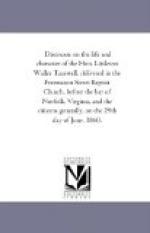and bequeathing his name to a beautiful county overlooking
the waters of the Chesapeake, which it still bears.
He served in the assembly at a memorable period.
The questions of the age were to be settled.
He recorded his name in favor of the bill establishing
religious freedom, where it will shine for ever.
He voted for the resolution convoking the meeting
at Annapolis, which was the seminal germ of the present
federal constitution. He voted to send delegates
to the Federal Convention, which formed the present
federal constitution; and in the convention which
ratified that instrument in the name of Virginia,
he voted for its adoption; and when Norfolk commemorated
the installation of the federal constitution by the
firing of guns, by the display of flags, by civic,
mechanical, and military processions, conspicuous
on that great day was the general, who acted as the
Chief Priest of the august ceremonies which honored
the birth of a nation. He was always elected
to any office to which the people could call him.
His address had the tinge of the soldier, but was most
fascinating. No familiarity could impair its effect.
The bar regarded him with affection and reverence.
All the men about town loved him. The women almost
adored him. A smile from the General on a gala-day,
when mounted on his charger, which he managed well
to the last, or the lifting of his three-cornered
hat on the sidewalk, was a trophy which the prettiest
woman, maid or matron, would treasure away among the
spolia opima of her hoard. His social position
was of the highest. He was known far and wide,
and played most becomingly the part of host to distinguished
persons from abroad. Some of our old citizens
remember the coaches and four which used to pass down
King’s lane to his modest residence at the foot
of tide. One of the acts of his life was characteristic.
He was on a visit to his brother at St. Kitts, when
the French fleet lay-to off the island, and levied
a sum of money upon the people, which they paid.
The French then levied another sum, which the people
of the island were wholly unable to pay. In this
dilemma the people of St. Kitts had recourse to General
Mathews, who, dressed in his uniform as an American
general officer, went on board the hostile fleet,
and induced the admiral to accept an order from him
on the American Consul in Paris, for the sum in question.
The fleet then sailed away, and the island was safe.
In due time the order came back protested. Suit
was brought and judgment obtained against him, and
the venerable patriot spent his last days in prison
bounds for a debt which the British Government ought
to have paid with gratitude as well as with money.
In 1802 he was approaching his sixtieth year, but
was vigorous and attentive to business. He was
a fine speaker. His voice was melodious, and
its compass exceeded belief. It could be heard
along the line of a whole brigade, and in the clatter
of a skirmish. It is one of the traditions of




